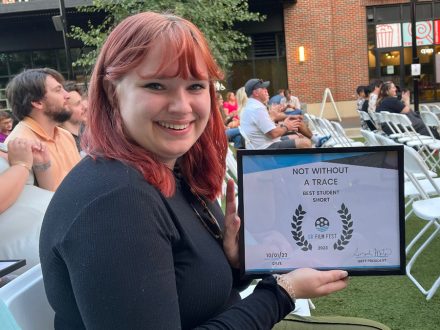The Elon alumna produced a documentary, titled “Not Without a Trace,” for her BFA thesis project, and the film is set to screen at two upcoming film festivals in North Carolina.
Emily Prins ’23, a cinema and television arts BFA major, produced a captivating documentary, titled “Not Without a Trace,” generating positive responses on the film festival circuit. Following its festival premiere at the Grand Rapids Film Festival in late September, the 14-minute film will also screen at two North Carolina-based festivals: the Raleigh Film and Art Festival (Oct. 6-8) and the Indigo Moon Film Festival (Oct. 13-15) in Fayetteville.

Prins’ film chronicles the February 1981 disappearance of 14-year-old Deanie Peters, a Grand Rapids, Michigan, teenager who left the gymnasium at Forest Hills Central Middle School and was never seen again. Her presumed death shook the suburban area, and the effects are still felt today.
The Elon alumna shared that she is proud of the film’s reception, noting how competitive festivals can be. “I was really lucky to have been selected for the festivals that I did,” Prins said. “It has been really exciting.”
Prins credits her time at Elon – and particularly two documentary courses – for positively impacting the direction and production of her film. She expressed great appreciation for the mentorship she received from Associate Professors Nicole Triche and Doug Kass as well.
As part of his coursework, Kass deepened Prins’ understanding of the genre as she watched and analyzed films during the class. “It was helpful to get my feet wet,” she said.
Prins also thanked Triche for her unwavering support during the two-year project. The student filmmaker said Triche’s tutelage – and her Advanced Documentary and Nonfiction Production class – taught her how to work on “bigger projects for a longer period of time,” she said.
From this mentorship developed a strong friendship between the student and professor. (Last spring, Triche provided the introduction for Prins’ Outstanding Senior Award.)
“Emily was a joy to have as a student,” Triche said. “I couldn’t be more proud of all she has already accomplished. This was a challenging documentary project that required extensive research, travel and cold calls to set up interviews. Emily’s filmmaking avoids sensationalism and emphasizes empathy.”
As part of her own educational process, Prins watched several documentaries that showcased the ethics of true crime making. She compares the style of her film to “The Keepers,”a Netflix docuseries that tackles the unsolved murder of a beloved nun and teacher from Baltimore. “It follows community members working together to solve a case, which is similar to the concept for my film,” she said.
Prins said she drawn to the project because of a personal connection – her father lived in Grand Rapids at the time of the young girl’s disappearance and knew of the community’s longstanding grief. “I grew up hearing about the disappearance and how it affected my dad,” she said. “When I came to Elon, I knew I wanted to focus on documentary film.”
As part of her filmmaking, Prins contacted several members of the Peters family, beginning with Diane’s brother and eventually their mother. She also spoke to a journalist who covered the story, as well as other community members. Prins spent two weeks in Michigan during summer 2022 filming at several locations. The film’s post-production ran from September to November, with editing completed between January and April.
Because of the Grand Rapids festival’s location, many of the documentary’s participants were able to attend – a fact that Prins cherished.
Throughout the filmmaking process, Prins’ father was a huge supporter and accompanied his daughter during her trip to Michigan. Not long after, he suffered a stroke that has made it difficult for him to speak and interact as he once did. As a result, the film has taken on even deeper meaning to Prins. She called the memories and videos she made with her father in Michigan “sacred footage” to her.
To learn more about Prins’ work and projects, visit www.emilyprins.com.


